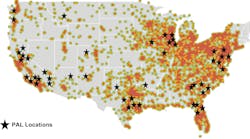UPS also will introduce a US$1.00 delivery surcharge to commercial shipments headed to more remote ZIP codes. These ZIP codes are the same as those covered by the current residential delivery area surcharge, which was first applied in 1999 and remains at US$1.75. The premium for packages and letters delivered to residential addresses will rise from US$1.15 to US$1.40.
In addition, UPS will discontinue the fuel surcharge on UPS Ground service, while a new index will be applied to UPS Next Day Air, UPS 2nd Day Air, UPS 3 Day Select and international services to reflect their higher fuel consumption.
Also beginning in January, all UPS services in the U.S. will expand size limits, increasing from 130 inches to 165 inches in length and girth combined for oversized packages. The UPS maximum weight limits remain the same.
Industry observers are waiting to see if rivals FedEx Corp. and DHL Worldwide Express will match the increase, because they usually have followed UPS’s lead in rate matters.


